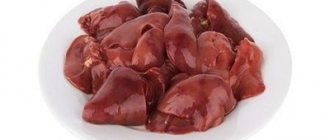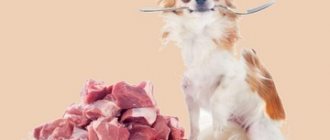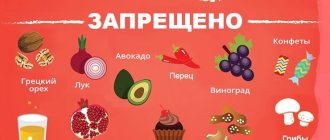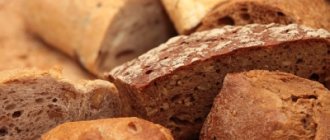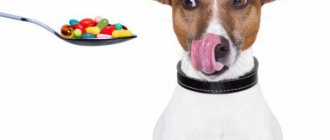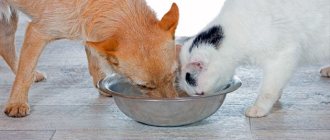Evolution of diet
In the wild, wolves first consume the internal organs of their victims before moving on to the tough, less nutrient-rich muscles. They primarily consume organs such as the liver, heart and stomach. These organs are the best parts of the body in terms of the quantity and quality of nutrients they contain.
Do not forget that all dog breeds, from the smallest to the largest, descended from wolves and their ancestors. Therefore, supporters of a raw food diet, citing the origin of domestic dogs, recommend using raw meat and organs in the diet. Liver and other by-products, along with meat, are the main sources of protein in such diets. Other experts argue that the diet of domesticated pets has evolved significantly to mimic the human diet. Therefore, to maintain the health of a dog, it requires slightly different nutritional elements.
Can dogs have pumpkin and sunflower seeds?
Since this product is really very healthy and contains a lot of plant proteins and essential amino acids, you can offer it to your pets . The main thing that the owner must understand is that seeds, be they pumpkin or sunflower, cannot become a complete food for the dog, so they cannot replace lunch or dinner. As a treat, they are ideal for pets, the main thing is to peel them, since this is garbage they don’t need, which ends up leaving their body anyway.
It is also worth considering that seeds in large quantities are contraindicated for dogs , as they provoke the outflow of bile, which means they put a lot of strain on the liver and gall bladder. The increased content of oils, which complicate the digestion process, also has a negative effect on the body; in large quantities, sunflower seeds can cause dyspepsia, liver problems and colitis. This is a difficult to digest product, so in large doses it can cause stomach upset.
Seeds should be given by adding them to your pet's food several times a week during one of their meals. Under no circumstances should dogs be allowed to eat salted seeds, as they contain sodium salts, which can increase blood pressure and negatively affect the gastric mucosa and cardiovascular system.
You should also not give fried seeds to your pets, firstly, because there are no beneficial substances left in them after frying, and secondly, overcooked seeds harm the gastrointestinal tract, as well as the liver. It is best to buy raw seeds and add them to your animal’s food.
Liver deficiencies
Feeding your dog liver can have quite a few downsides, despite how healthy it may be. Liver contains high amounts of vitamin A, so much so that it can lead to a vitamin overdose. Too much vitamin A can lead to bone spurs, muscle weakness, and digestive problems. The liver may also contain hormones and various supplements that were fed to the animal. Some wild animals' livers can have liver flukes and other diseases that can harm your dog.
Growing
Home \ All Articles \
How and what to feed Spitz
Serious damage to the health of a Spitz can be caused by errors in nutrition. To prevent such situations from arising, you need to clearly understand: the Spitz’s body is different from the human body. The Spitz's stomach is larger, the composition of digestive juices is different, and the intestines are shorter. The Spitz's stomach best digests raw protein foods and carbohydrates that have been previously heat-treated.
The human body adapts quickly to a variety of foods. The Spitz's body, on the contrary, reacts negatively to a change in regular food products. Remember: what is suitable for human food can be dangerous for a Spitz.
What not to feed a Spitz
The following foods should not be offered to your Spitz:
- Any sweets. The need for glucose can be satisfied through honey and fruits. — Smoked meats and hot sauces. Consumption of these products can cause diseases such as gastritis and enteritis. - Pork, fatty food. These foods are harmful to the liver and can lead to the death of your pet. - Any bones, especially chicken bones. Sharp bone fragments can cause perforation of the stomach and intestines. Boiled bones get stuck in the intestines and clog it, leading to inflammation. For the same reason, you should not feed your Spitz with minced bones. — Bakery and pasta products. This food causes severe fermentation in the digestive system, which can lead to volvulus. - Beans and potatoes. Such food does not cause harm, but is also not absorbed by the Spitz’s body. — Spices, any spices, aromatic substances. These products may cause allergies. - Salt. It is not recommended to give it, you can only add salt occasionally. — Barley and pearl barley. These cereals are not digested, so they do not bring any benefit.
What can you feed your Spitz?
- Raw meat. This is a very important product in the Spitz diet. A one-month-old puppy should be given finely chopped beef every day. From two months you can give meat with veins and small cartilages. In addition to beef, the puppy can be fed horse meat and lamb. The meat must be fresh. To avoid infection with helminths, meat can be frozen and then doused with boiling water. It is good to give your Spitz boiled rabbit or poultry meat. The bird's neck is considered safe. - Cartilage. In addition to meat, a Spitz needs cartilage. They contain many minerals. Cartilage cleans and strengthens teeth, and also entertains your Pomeranian. Cartilage and tendon bones can be purchased at a pet store. — By-products: beef liver, lungs, kidneys, tripe, lips, trachea. Their nutritional value is less than that of meat, but they are very healthy. By-products should be washed and boiled. Tripe is beef gizzard and is considered the ultimate canine treat. In our opinion, it has an unpleasant odor, but it is very rich in enzymes and microelements. Feeding your Pomeranian rumen will discourage him from eating feces. Chicken gizzards, hearts, and liver are also good. - Fish. It is better not to feed river fish; it usually contains a lot of helminths. Sea fish should be given instead of meat 2-3 times a week. Large bones should be carefully selected and the fish should be boiled. You should not overuse fish; it will not replace meat. Fish consumed in large quantities can upset the balance of vitamins and minerals in the body. - Eggs. They are boiled and given 1-2 times a week. — Unsweetened fermented milk products. Kefir, fermented baked milk, and cottage cheese in unlimited quantities are good options. You can give low-fat cheese. — Cereals, boiled cereals (not steamed): millet, buckwheat, rice, corn grits. Occasionally you can give rolled oats; if fed frequently, it can cause diarrhea. — Vegetables: carrots, pumpkin, beets, zucchini. Vegetables need to be boiled, seasoned with sour cream or vegetable oil. — Berries and fruits: pears, apples, raspberries, strawberries, dried fruits and others. — Greens: parsley, spinach, lettuce, wild nettle and dandelion, seaweed.
Dry ready-made food
Ready-made dry food should be selected according to the age and weight of the Spitz. It is recommended to choose branded, high quality, super premium food. There should always be fresh water in the bowl.
Vitamins and minerals
If you feed your Spitz with dry ready-made food, then he does not need vitamin-mineral complexes. When feeding natural foods, vitamins and minerals should be added to the diet. You can buy them at a pet store.
How often to feed
The frequency of feeding a Spitz depends on its age:
- 1-2 months: five meals a day.
- 2-4 months: four feedings a day.
- 4-8 months: three feedings a day.
- from 8 months: feeding twice a day.
You need to feed your Spitz at the same time. Food should be at room temperature.
Spitz nursery “YOUR CHARMING” Breeder Mihai Elena tel. 8-351-904-14-86 vash-spitz.ru
How much and when?
Even in a homemade diet, liver should not be used as the main or sole source of protein. To get the best results from raw feeding and other similar diets, your puppy needs a variety of foods to stay healthy and receive the most nutrients. Liver as a treat is ideal for adding variety to the diet as most dogs really enjoy the taste. Small portions of liver, preferably boiled, up to a couple of times a week, but no more, will be an ideal additional dish for your pet.
Small breeds of dogs, such as Yorkshire Terrier, Pekingese, Chihuahua, Dachshund, Toy Terrier or, for example, Spitz, can be given both beef and chicken liver, but in limited quantities 1-2 times a week, because, among other things, it can cause diarrhea.
Feeding your Chihuahua homemade food
The good thing about homemade food is that you know exactly what you are giving to your little friend. After all, we ourselves prefer homemade food rather than semi-finished products. Food for Chihuahuas should always be fresh and only of good quality. The disadvantage of eating at home is that you need to cook every day, and breakfast should be different from dinner. Cooking a large pot of porridge and feeding it to your Chihuahua all week is strictly prohibited! Thus, you can greatly harm the dog's health. If you decide to cook for your pet yourself, then you will need to accurately calculate the required amount of proteins, fats, carbohydrates, minerals and vitamins in your Chihuahua's diet. And this is quite difficult. Ready-made food is more practical, but it is still a semi-finished product. And we have no choice but to simply hope that the real composition of the food corresponds to what is stated on the packaging.
Ready-made dry food is balanced and contains all the necessary nutrients. When eating at home, your pet can get fats and proteins from the following products: beef, horse meat, white chicken, lean turkey, rabbit, lean sea fish fillet. Fish and chicken must be boiled and deboned. The rest of the meat can sometimes be given raw, but let boiled or stewed meat predominate in the Chihuahua’s diet, this will protect the dog’s body from all sorts of parasites. Pork is excluded completely, as it is too fatty for a Chihuahua. Meat and bone broths are not recommended for dogs. Sometimes you can give meat by-products: liver, hearts, lungs, etc. Just not often.
Regarding fermented milk products, give your dog kefir, low-fat cottage cheese, fermented baked milk and yogurt, but without fruit additives. Sour cream, butter, fatty cottage cheese and margarine must be excluded, as they are too fatty, difficult to digest and can lead to stomach upset. We’ll also include hard cheese there, which, in addition to being fatty, is also very salty for a dog. You can give a whole quail egg or half a chicken yolk, only boiled, and no more than once a week.
The dog should get carbohydrates from vegetables and cereals. From cereals it can be buckwheat and rice, the rest is poorly digestible. Vegetables: zucchini, pumpkin, lettuce, cauliflower or broccoli. Carrots are especially useful. White cabbage and legumes should not be given! Vegetables should be boiled or stewed in water, this way they are better absorbed. It is also recommended to add a few drops of vegetable oil to vegetables. Sometimes you can give fresh grated unsweetened fruit. Especially apples and bananas.
Eliminate sugar and any sweets. When preparing food for a Chihuahua, forget about salt and spices; you should not add them “for taste”; dogs’ taste buds are significantly different from ours, so your pet is unlikely to appreciate it. Salt and pepper are harmful to a dog's digestive tract.
When creating your pet's menu, remember that the ratio of proteins and carbohydrates should be as follows: 2/3 proteins and 1/3 carbohydrates.
Make sure your Chihuahua always has fresh water. It is not recommended to give water from a tap or boiled, preferably filtered or mineral water from bottles.
Article about feeding Chihuahuas with dry food
